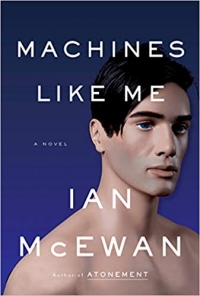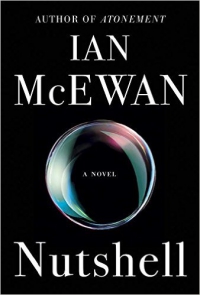Machines Like Me by Ian McEwan
 Monday, April 22, 2019 at 7:15AM
Monday, April 22, 2019 at 7:15AM 
First published in Great Britain in 2019; published by Doubleday/Nan A. Talese on April 23, 2019
In Machines Like Me, Ian McEwan returns to the topic of false accusations, the underpinning of Atonement, but in a much different context. The novel is light but its subject matter is not. McEwan explores the failings (and perhaps the strengths) of humanity by comparing humans, including the false accuser, to the ideal of artificial humans who believe that proper behavior is clear and easily defined. The artificial humans are self-aware and independent, so it shouldn’t be surprising that they become depressed about the human condition.
McEwan tells the story in the context of an alternate history, a form used to great advantage by Kingsley Amis in The Alteration and Philip K. Dick in The Man in the High Castle to explore how history shapes life. The story takes place during the Falklands War, a miserable time for the British Navy, although McEwan imagines it to have been more miserable than it was — the British Navy is defeated and steams home in shame. Other changes in the world include an American decision not to drop the Bomb on Japan, the Beatles’ decision to reunite after 15 years, Jimmy Carter’s reelection to a second term, and Alan Turing’s survival into old age, allowing him to solve P versus NP and introduce a new age of computing.
Thanks to Turing, artificial humans called Adam and Eve are on the market in 1982. Science fiction stories about artificial humans typically focus on whether an artificial creation that develops self-awareness and seems to have (or desire) free will should be given the status of a natural human. McEwan’s story addresses that conundrum but gives it a twist. When his Adams and Eves become self-aware, they struggle with existentialism. Some give themselves a robotic form of lobotomy, perhaps because they are unable to live with the pointlessness and futility of human life, perhaps because they are simply disappointed by humans.
The novel’s narrator, Charlie, impulsively blows his inheritance on an Adam. Adam quickly warns Charlie that his upstairs neighbor, Miranda, is a malicious liar. Charlie and Miranda have developed an amiable companionship. On the day Adam pronounces his warning, Charlie shuts off Adam and sleeps with Miranda.
Insecurity soon sets in and Charlie wonders how Adam could have judged Miranda without ever meeting her. Perhaps Adam is intuitive, a proposition that gives McEwan an opportunity to explore both the history of Artificial Intelligence and the difference between computing and intuiting (if a difference actually exists). McEwan later explores the nature of self, recognizing that neuroscientists and philosophers are debating whether the concept has meaning. In the meantime, Charlie and Miranda each complete one-half of a checklist of attributes that will program Adam’s personality, the digital equivalent of giving him their combined genes.
Charlie begins his own investigation of Miranda, although most of the information he finds pertains to her father, an “old-style literary curmudgeon” who detests technology. Of course, Miranda is curious about the biologically correct Adam, and it does not take long before Charlie wonders whether he is being “cuckolded by an artefact.” Whether or not his suspicions are founded, the question opens the door to a discussion of “robot ethics,” the notion that properly programmed beings will behave more scrupulously than ethically-challenged humans. Can a machine betray its owner? Unlike Adam, Miranda has no owner, so can the machine be blamed if she wants to test its performance?
Charlie and Adam (mostly Adam) have wide-ranging discussions of quantum mechanics, haikus, the limits of human understanding (particularly the understanding of other humans) as informed by literary traditions, and the future of collective thought. Charlie has a couple of discussions with Alan Turing about the nature of artificial intelligence and how it might react to human intelligence which, despite having the ability to solve problems like poverty and global warming, chooses not to do so. Humans know how to live with despair. Can machines learn to do live with their despair of humans? Turing explains that he once thought the body was nothing more than a machine, but changed his mind after facing chemical castration as a criminal punishment for being gay. (In this history, Turing rejected the punishment. In history as we know it, he accepted castration and committed suicide two years later.)
So this is a largely a novel of philosophy, but it also has a lively plot. Part of the plot concerns the false accusation (made with — the accuser imagines although the reader might not — a noble purpose) and its potential consequences. Another part of the plot concerns atonement. Another is a love story, including the possibility of an instant “two daddy” family as Charlie, Miranda, and Adam meet a young boy who needs foster care. The fact that Miranda’s father likes Adam more than Charlie (and is mistaken about which is the actual human) adds a comedic wrinkle to the romance, as does Charlie’s concern that becoming a father would be “a dereliction of duty to a larger purpose, assuming I could find one.”
In the end, Adam is a better person than a human would ever be, but that might also be his tragic flaw. Adam does not believe in revenge or greed and, while most humans would agree with him, he acts in accordance with his beliefs, which humans too rarely do. Yet humanity might not be well served by the inhuman rectitude and logic of a robot. The novel asks readers to decide whether rectitude should ever give way to friendship and loyalty, a concept that may separate human minds from calculators. All of that — as always, McEwan manages to stuff a lot into a fairly small package — adds up to an engaging, thought-provoking novel.
RECOMMENDED


